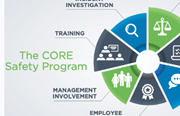Annual HAZWOPER and DOT Physicals Can Save Lives (Including Your Own)
By: Cascade EnvironmentalModern life demands yearly traditions that most of us aren’t fond of, such as spring cleaning, filing taxes, and renewing car tabs. For those working in environmental field services, the list may include annual HAZWOPER and DOT physicals. Even though requirements such as these can feel like tedious impediments to getting work done, they’re important in ensuring safety on project sites, on the road—and, in cases like Larry Weiss’, they may even save lives.
Larry joined Cascade 16 years ago as a driller assistant out of the Flint, MI office. He was promoted and became a driller, a position he held for 12 years. Due to his role, he was required to complete annual HAZWOPER and DOT physicals. He never thought much of it, until the day his bloodwork came back with an alarmingly high white blood cell count. The examining physician told Larry to see his primary care doctor immediately for further tests.
Larry followed through and was diagnosed with cancer.
“Look what the physical did for me,” he says. “It caught my cancer early. It’s pricey to do a complete physical like Cascade does—they do bloodwork, and most companies don’t.”
Alex Amort, Cascade’s Director of DOT Compliance, agrees. “We aim to provide a comprehensive exam every year for our field services employees,” he said. “Part of that obviously is to comply with federal regulations, but we go beyond what is mandated to ensure the safety of everyone on our team. That’s why we provide field services employees with services like annual bloodwork, chest x-rays every three years, and an EKG when medically indicated.”
While the annual exams are mandatory for employees who work in the field or maintenance yards, they don’t have to just be one more box to check off your to-do list. Alex encourages everyone to get as much out of the appointment as possible. He recommends three ways to do so:
- Prepare your paperwork and documentation.
Gather documentation about any relevant medical conditions, such as diabetes, sleep apnea or heart disease. Collect a list of the medications and vitamins you take. - Prepare yourself.
Get a good night of sleep before your appointment. If you’re fasting for a blood test, remember that beverages with caffeine or a lot of sugar can impact your bloodwork as well as your blood pressure and heart rate—it’s best to avoid them. Fasting doesn’t mean you need to skip medication, however; be certain to take what you need to be well. - Prepare your questions.
If you have questions about symptoms, existing conditions, or any of the tests being run—ask them. Most physicians are happy to educate and help you better understand how to take care of yourself. If your question is complex or requires additional tests, they may recommend you see a primary care physician. If you don’t have one, the examining doctor may be able to provide a recommendation.
Annual HAZWOPER and DOT physical exams may never crack the top ten list of things you love about your job, but a proactive approach can ensure they go smoothly and you get the most out of them.
And Larry? Since his diagnosis, he’s received treatment and halted the cancer’s progression. Larry now goes in twice a year for shots that keep the cancer at bay, but has returned to the Flint yard as a shop worker, where he encourages his colleagues to be religious about scheduling their own annual exams.
“I’m glad I did the physical every year, that’s how I caught this cancer,” he says. “Our team, they’re watching over their guys. People here are like my family.”
If you’d like to learn more about how Cascade looks out for employees, check our Careers page.









